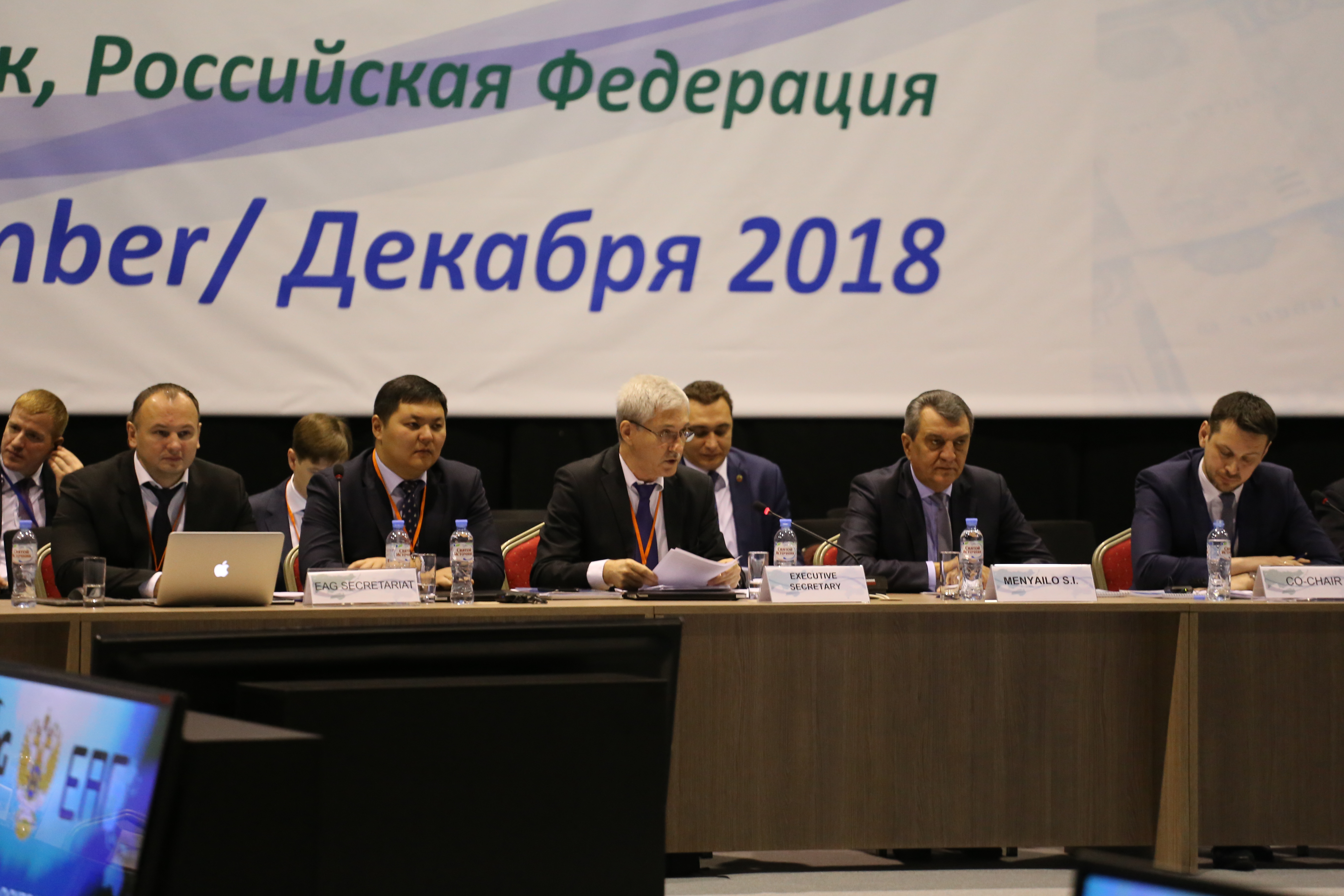-

11 December, 2018
The Eurasian Group on Combating Money Laundering and Financing of Terrorism (EAG)/Asia-Pacific Group on Money Laundering (APG) joint workshop was held in Novosibirsk (Russia) on December 3-5, 2018.
The workshop opened with welcoming remarks from Sergey I. Menyaylo, plenipotentiary representative of the Russian president in the Siberian Federal District; Vladimir P. Nechaev, EAG executive secretary; and David Becker, director for typologies at the APG Secretariat.
According to Menyaylo, it has been more than 10 years since the establishment of the Interagency Working Group on Combating Illegal Financial Transactions. The implementation by Russia of the FATF Recommendations has led to a 50 percent decline in the number of suspicious transactions carried out in the district. Only by combing the efforts of the entire international community can we overcome modern challenges and threats, stressed Menyaylo.
S I. Menyaylo: "We all understand that in order to be effective in combating international terrorism and cross-border and transnational crime, we should constantly improve international cooperation between financial intelligence units, law enforcement, supervisors and the private sector."
David Becker: "The EAG is one of the Asia-Pacific Group's closest partners among all FATF-style regional bodies. This is already a second typologies workshop we have held jointly with the Eurasian Group, the first was in Mongolia in 2013, which was preceded by a joint assessors' workshop. The 2018 workshop was attended by representatives of more than 20 NPOs and organizations from the private sector. From the APG's view point, partnership with the private sector is key to our success."
V P. Nechaev: "We've gathered here today to consider the issues that are key to our efforts to disrupt money laundering or terrorist financing schemes used by criminals. Two of these issues – the use of criminal proceeds to finance terrorists and the risks associated with virtual assets – are listed among the FATF's current priorities. Some time ago, the EAG researched the issue connected with the purchase of tickets for foreign terrorist fighters. I must say that for us and the CIS Anti-Terrorist Centre, one of the surprise outcomes of this work was the interest shown by the ICAO [International Civil Aviation Organization]."
The issues discussed at the forum were structured into three thematic sections: the use of criminal proceeds, including from organized crime, to finance terrorists; human trafficking; and the risks associated with digital financial assets.
During the first section, participants familiarized themselves with the FATF's assessment of terrorist financing risks; reviewed countries' reports on the national assessment of risks in this area; and studied the findings of the APG's regional risk assessment, the UN's research into the potential links between terrorist financing and organized crime, and the relevant UNSC resolutions. The meeting included presentations of financial investigations into the use of criminal proceeds – including from organized crime – to finance terrorists, conducted within the framework of the EAG/APG joint study on the same topic, whose findings will be presented in the second half of 2019.
Participants in the section on risks related to virtual assets, meanwhile, reviewed countries' reports on the use of virtual assets for money laundering, studied the experience of national competent authorities in identifying and investigating such crimes, and talked about the use of enforcement measures and confiscations. They also discussed the role of the private sector in identifying and analysing the relevant schemes, including the mechanisms for identifying unregistered providers of virtual asset services, the possibility of obtaining information on cryptocurrency transactions from the traditional banking sector and the use of specialized hardware. According to a representative from the FATF Secretariat, this workshop represents a significant contribution by the EAG and APG to the current FATF project to draft operational guidelines on the identification, investigation, seizure and confiscation of virtual assets.
The anti-trafficking and smuggling section took place with active participation of representatives from civil society and the private sector, who familiarized the participants with the initiatives aimed at identifying financial transactions related to these crimes.
The meeting was attended by over 260 representatives of financial intelligence units, law enforcement and supervisory agencies and the private sector from more than 60 countries and organizations of the Eurasian and Asia-Pacific regions.
The workshop ended with the presentation of ITMCFM projects for the international AML/CFT system participants.
In his closing remarks, the head of Rosfinmonitoring's Siberian Federal District office, A A. Dolbnya, noted that the discussion of the topics raised at the workshop is particularly important for the Russian Federation in the context of the upcoming FATF mutual evaluation.
A A. Dolbnya: "Many countries participating in the workshop have already hosted visiting missions and appreciated the high bar set by the FATF for national AML/CFT systems. I'm confident that typologies discussed in the sections will find practical application within the national AML/CFT systems, helping mitigate the risks stemming from the use of digital financial assets for criminal purposes and bolstering the fight against terrorist financing and human trafficking."Background:
The Eurasian Group on Combating Money Laundering and Financing of Terrorism (EAG) and the Asia-Pacific Group on Money Laundering (APG) are FATF-style regional bodies that pursue independent AML/CFT policies based on the FATF Recommendations. The EAG is a FATF-style regional body uniting Belarus, India, Kazakhstan, China, Kyrgyzstan, Russia, Tajikistan, Turkmenistan and Uzbekistan. The EAG is an associate member of the FATF. The APG, where Russia holds observer status, includes 41 countries of the Asia-Pacific region among its members.

 Login to your account
Login to your account Eng
Eng Рус
Рус